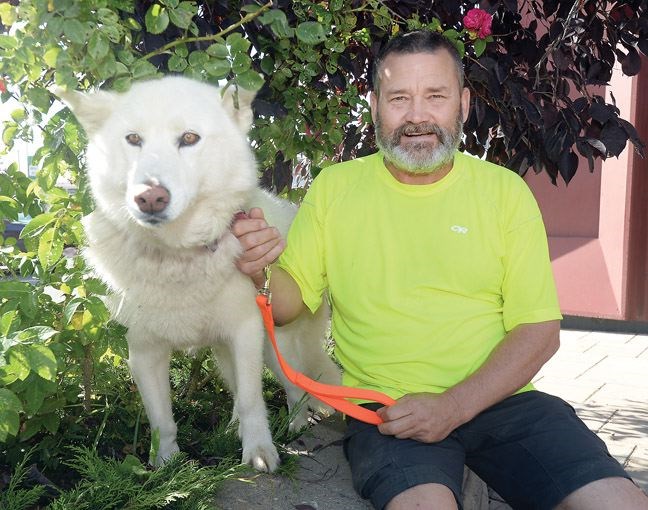He might forget the words he wants to use to express himself and can't recall the name of a friend he just mentioned moments ago but Highway of Tears walker Brett Merchant, 56, never loses focus on why he's on the road.
"This is for the young women who are missing and murdered on the Highway of Tears," said the Kimberley resident on Wednesday afternoon as he stopped in Prince George during his solo trek from the B.C-Alberta border on Highway 16 to Haida Gwaii. He began the 1,236 kilometre journey on Sept. 1 at noon.
"Yes, thanks, I hear 'you're a great guy, good job for doing this' and thanks again very much but that's not what this is about for me - it's about keeping the awareness going for the safety of aboriginal women," said Merchant, who suffers from SLE lupus, early onset dementia and diabetes. He knew if he didn't do something quick, he would lose the physical ability to do anything at all.
He watched the Highway of Tears documentary on Nextflix recently and decided to go, leaving his care home and not knowing if he has a home to go back to when the time comes to return to Kimberley in the new year.
Merchant brought Kura, his 10-year-old Siberian husky-wolf cross, who is in perfect health.
Merchant's veterinarian OK'd Kura for the trip before they left, and again here in Prince George.
The vet will be back in a month to check on Kura again.
Merchant, who has a tremor that affects his whole body continuously, is planning on ending his journey in Haida Gwaii on Dec. 31 at midnight, because then he starts the new year off knowing he completed the journey.
"Kura and I, we're winter. It was too hot yesterday (it reached about 20 degrees and was sunny) and when it rained all week before that was OK, we just kept walking because it's too hard to pack up and carry wet gear," said Merchant about the first leg of the trip.
As the dog draws attention at the Visitor Centre, Merchant explains again that this is not about him.
"Everybody is the same, we are all equal and we need to change society," said Merchant. "The First Nations people were hit down, knocked to the ground and we have to help them up, not because they're native, but because we are the ones that knocked them down. And the whole world has to do that not just me or you but everyone."
Merchant grew up in Cranbrook where his parents owned a downtown shoe store. When Merchant went to work on a Saturday with his dad, Robert, his job was to wake the men who were sleeping in the alley out back. When the men woke up, his dad would put them to work, shoveling snow, sweeping the sidewalk or taking out the garbage, but no money changed hands. Merchant was sent to the burger joint across the street with the men who would get a coffee and breakfast or a burger for lunch depending on the time of day. Merchant learned early that a hand up was much better than a hand out.
Merchant has always had a close connection to First Nations people and understands their plight.
"You ask yourself what's wrong and you realize it's the whole picture," said Merchant. "It's not just one thing. Countries come over - even today, right now - and kick you off your land and then put you on a little block and say there, that's yours now, so you're broken right there. Your culture is busted."
Residential schools were pure hell, even for some people that he knows, Merchant said.
"So you're either taken by the government away from your home or sometimes your mom and dad hear it's a good thing so they take you to the school and they take you to this school and then they take you to another school and your parents don't even know where you went. Some were beaten and raped and you don't get to talk your language and you have to learn a new one and learn to write and lose your heritage and lose everything and now you're down right here on the floor. Then you come out of there and how can you even learn to love a dog, when you were not shown love even though you went to this so-called good thing but it's crap. Some people made it out - I don't know how - they're stronger than I would ever be."
So everybody needs to help them, he added.
"I cannot undo the murders that have occurred along the Highway of Tears," said Merchant on his gofundme.com/highwayoftears page, trying to raise money for women's shelter projects.
"I hope that by raising awareness during my 1,236 km walk I can help prevent further injustices from happening."

.png;w=120;h=80;mode=crop)

